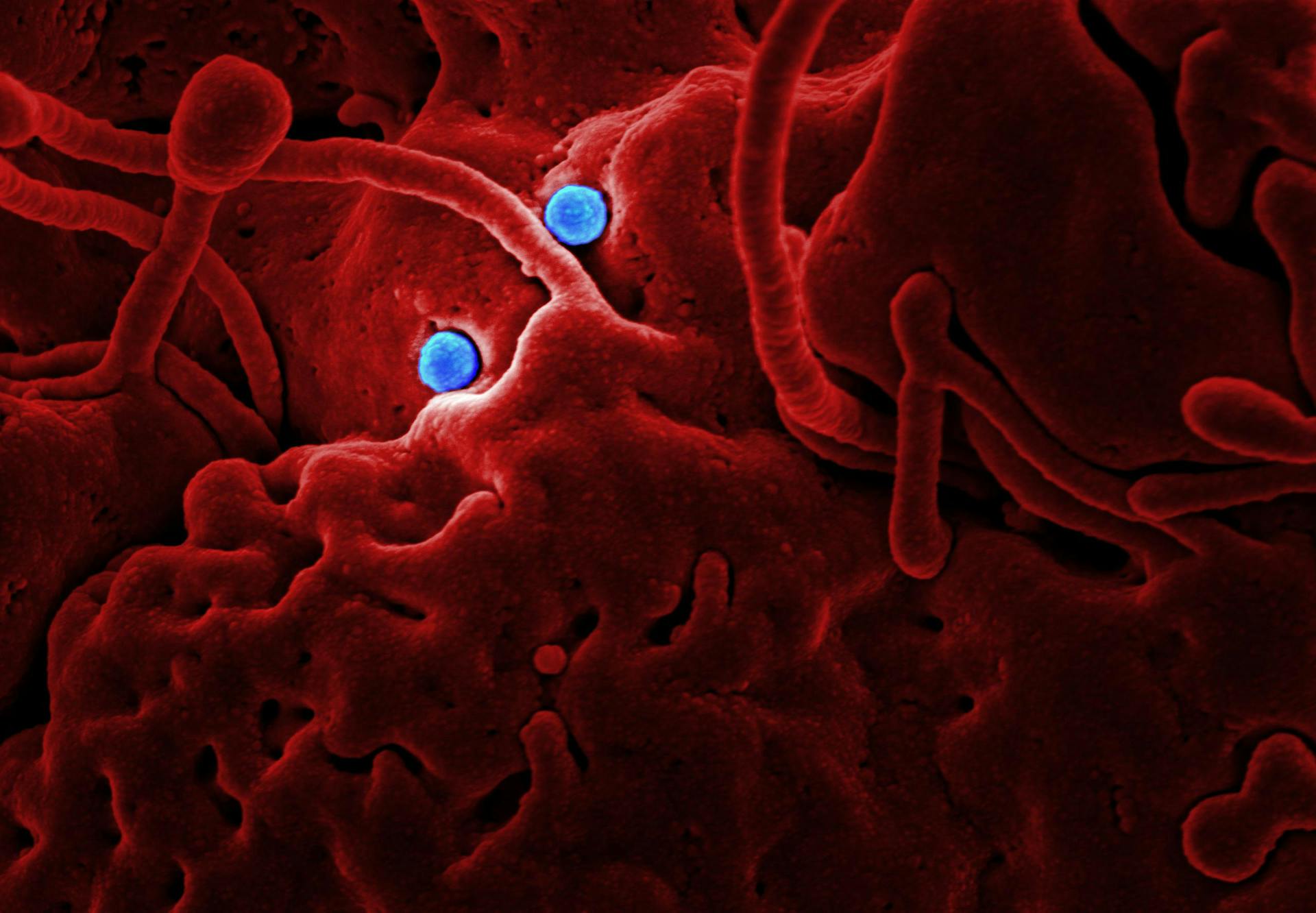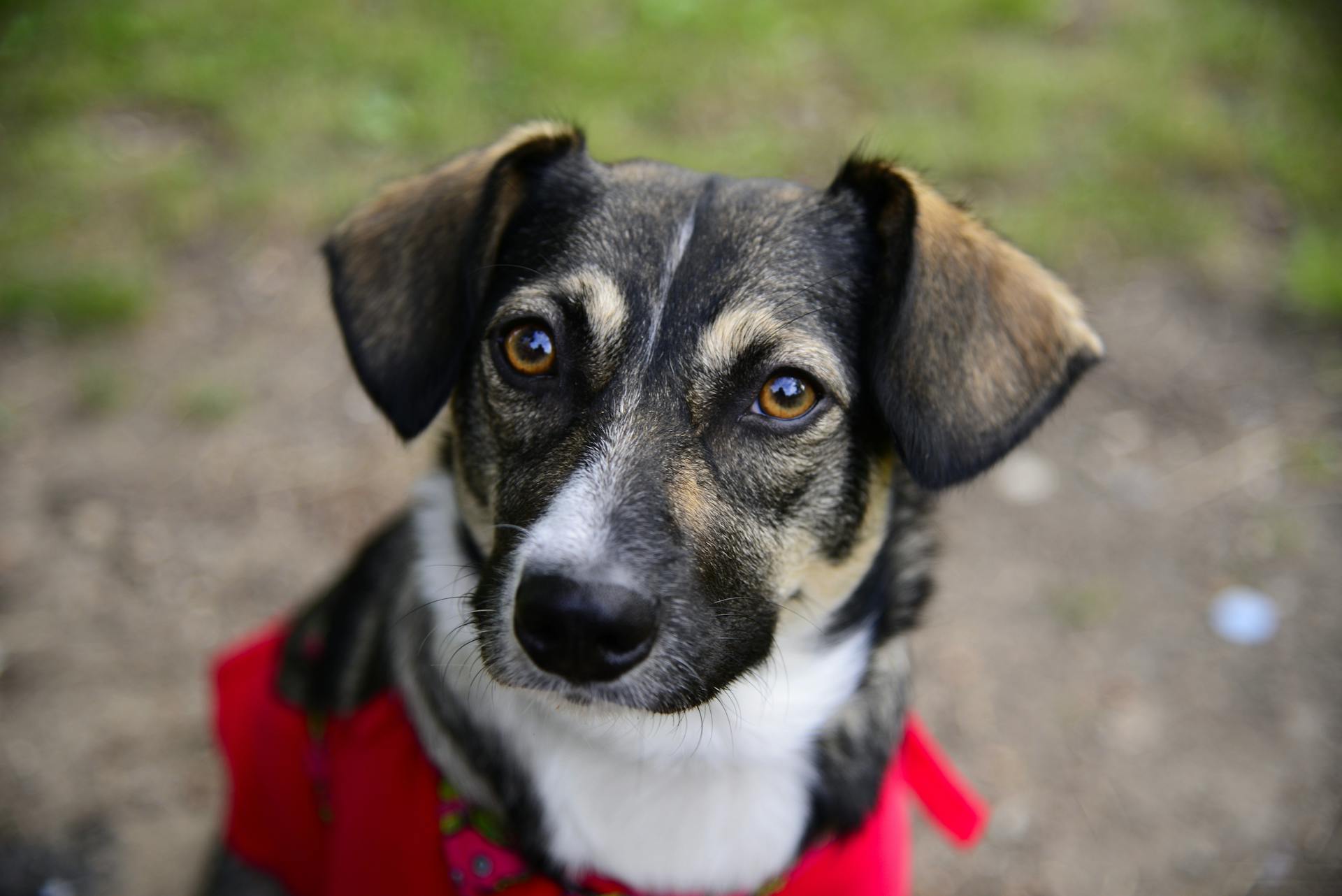
Cats can get parvo from dogs, but it's not a guarantee. The parvovirus is highly contagious and can survive on surfaces for months.
Parvo is usually associated with dogs, but it's a viral disease that affects cats too. The virus can be spread through contact with an infected dog's feces, vomit, or saliva.
Cats are more susceptible to parvo if they're not up-to-date on their vaccinations. This is especially true for kittens, who need to be vaccinated against parvo to prevent infection.
Signs & Symptoms
Cats can catch parvovirus from dogs, although it's uncommon. The virus is highly contagious and can spread quickly in animal shelters or areas where many cats and dogs congregate.
The symptoms of parvovirus in cats can be quite severe. They often include vomiting, diarrhea, and dehydration.
A cat's symptoms can vary, but they may also experience lethargy, loss of appetite, and a dull coat. In severe cases, the disease can lead to a weakened immune system and even death.
Here are some common symptoms of parvovirus in cats:
- Vomiting
- Diarrhea - may contain blood
- Frothing at the mouth
- Mild fever
- Dehydration
- Depression
- Loss of appetite
- Lethargy
- Dull, rough coat
- Green/yellow eye and nose discharge
- Loss of skin elasticity
It's essential to note that not all cats will display symptoms, and some may even die suddenly without showing any signs of distress. If you suspect your cat has parvovirus, it's crucial to seek veterinary attention right away.
Prevention & Protection
Preventing parvovirus infection in cats is crucial, and it starts with vaccination. The standard conventional form of parvovirus prevention is vaccination, which drastically limits the odds of infection.
Vaccination is usually given to kittens around 8 weeks of age, followed by booster shots throughout their life. The American Animal Hospital Association recommends the FPV vaccine for all cats, regardless of whether they spend time outdoors.
Kittens are typically vaccinated around 6-8 weeks of age, followed by a booster every three or four weeks until they reach 16-20 weeks of age. After the initial series, your veterinarian will let you know how often your cat needs to be re-vaccinated to stay protected throughout their life.
Worth a look: Parvo Vaccination for Dogs
To keep your cat safe, it's essential to follow proper hygiene practices. This includes thoroughly cleaning anywhere an infected cat has been, as the virus is strong and persistent.
If a cat in your house has been treated for FPV infection, they can continue to shed the virus for up to 6 weeks after recovery. To prevent re-infection, keep them isolated from kittens and unvaccinated or immunocompromised adult cats.
Here's a quick guide to help you protect your cat:
- Keep your cat up-to-date on their vaccinations, especially the FPV vaccine.
- Thoroughly clean and disinfect areas where an infected cat has been.
- Isolate any cat that has been treated for FPV infection for up to 6 weeks.
- Quarantine new pets for up to 2 weeks before introducing them to your household.
Diagnosis & Treatment
Diagnosis of feline parvovirus can be challenging, as the symptoms are similar to other illnesses. Your veterinarian will test your cat's stool and run a blood test to diagnose the disease.
If you suspect your cat has FPV, it's essential to seek veterinary care immediately, as early diagnosis and treatment can improve your pet's chances of recovery. The veterinarian may perform blood tests to check for the virus and assess your cat's overall health.
Intriguing read: Canine Brucellosis Test
Treatment for FPV is primarily supportive, aiming to manage symptoms and prevent secondary infections. This may include hospitalization, intravenous fluids, and medications for your pet.
Unfortunately, there is no direct cure for the virus, which is why prevention and early intervention are so critical. Your veterinarian will administer supportive fluids, nutrients, and antibiotics to help prevent secondary bacterial infection.
Kittens under the age of eight weeks have only a small chance of recovery, while older cats have a greater opportunity if treatment is provided early.
Discover more: How to Prevent Diabetes in Dogs
Similarities in Feline & Canine
Both feline and canine parvo are highly contagious, spreading quickly and easily from host to host.
The virus can be transmitted through direct contact with an infected animal, contaminated stool, or even people who have come into contact with the virus.
In fact, the virus can be spread through various means, including contaminated objects, such as food and water bowls, toys, clothing, and bedding.
Curious to learn more? Check out: Can Dogs Catch Herpes from Humans
The virus progresses rapidly, with the majority of parvo-related deaths in dogs taking place between 48-72 hours after the appearance of symptoms.
For unvaccinated cats, the virus can be fatal between 48-72 hours after the initial incubation period.
Both forms of parvo include symptoms such as severe diarrhea and vomiting, gastrointestinal disturbances, high fevers, and the potential for fatality due to severe dehydration and secondary infections.
Here are the key similarities between feline and canine parvo:
- Both strains are highly contagious
- The virus progresses very quickly
- The virus can prove to be fatal within 48-72 hours after the incubation period
- It may be spread through stool, people, or direct contact with another host
Getting Infected
Cats can pick up the virus through direct contact with an infected cat, or by indirect contact through contaminated food and water dishes, bedding, or litter boxes.
Infected cats shed the virus in their urine, feces, and nasal discharge. People can even spread the virus between cats if it is present on their hands or clothing.
The virus survives well outside of the body, so thorough cleaning and disinfection is critical in preventing transmission.
How to Get Infected?

You can get infected with parvo if you come into contact with an infected cat, either directly or indirectly. Direct contact can happen if you touch an infected cat or its bodily fluids.
The virus is also present in contaminated food and water dishes, bedding, and litter boxes, making it easy to pick up. People can even spread the virus between cats if it's present on their hands or clothing.
The virus survives well outside of the body, so thorough cleaning and disinfection is crucial in preventing transmission. This means washing your hands and any surfaces that may have come into contact with the virus.
The incubation period of parvo is usually around five days, meaning you may not show obvious clinical signs until after you've been infected for a while. Infected cats may shed the virus for several days before showing symptoms.
Get
Getting infected can happen in a variety of ways, but one of the most common is through close contact with someone who has the virus.
You can get infected by touching contaminated surfaces or objects, which is why frequent handwashing is crucial.

The virus can survive on surfaces for up to 9 days, so it's essential to clean and disinfect high-touch areas regularly.
A single cough or sneeze can release millions of droplets, making it easy to spread the virus to others.
Getting infected can be a serious issue, especially for those with weakened immune systems or underlying health conditions.
Caring for Cats
If your cat contracts parvo, it's essential to focus on treating the symptoms rather than trying to kill the virus directly.
There are no medications that can kill the parvo virus in cats.
You'll need to give your cat intravenous fluids to help them recover from dehydration, a common symptom of parvo.
Your vet will be able to advise on the best course of treatment for your cat's specific case.
Antibiotics may also be prescribed to help prevent secondary infections, but only under the guidance of your vet.
It's crucial to work closely with your vet to ensure your cat receives the best possible care during this challenging time.
Here's an interesting read: Best Food for Gassy Dogs
Frequently Asked Questions
Can a vaccinated cat get parvo?
While vaccination can prevent parvo illness, it's possible for vaccinated cats to still shed the virus even if they appear healthy. This is why it's essential to understand the risks and take precautions to prevent the spread of parvo.
Sources
- https://canna-pet.com/articles/can-cats-get-parvovirus-from-dogs/
- https://www.thedodo.com/dodowell/can-cats-get-parvo
- https://www.catster.com/ask-the-vet/can-cat-get-parvo-from-dog-vet-answer/
- https://chinovalleyanimalhospital.com/can-cats-get-parvo/
- https://basepaws.com/blog/how-cats-can-get-parvo-and-how-to-avoid-it
Featured Images: pexels.com


